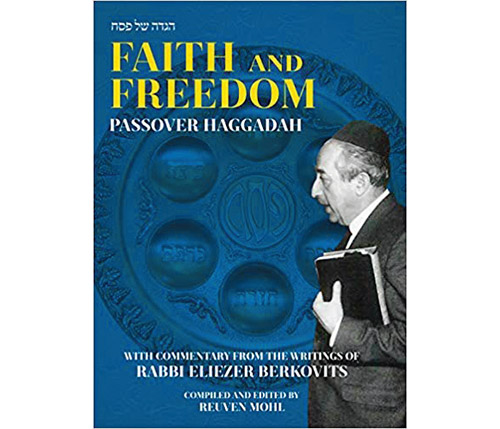
Reviewing: “Faith and Freedom Passover Haggadah: With Commentary from the Writings of Rabbi Eliezer Berkovits.” Edited by Reuven Mohl. Urim Publications. 2019. English. Hardcover. 160 pages. ISBN-13: 978-1602803336
In May 1958, President Oscar Fasman of Hebrew Theological College wrote to a friend about the Chicago yeshiva’s recent appointment. “I think I have one definite achievement in the educational field of the yeshiva by having brought to the faculty Dr. Eliezer Berkovits,” boasted Rabbi Fasman. “He is an excellent man in the field of philosophy, he is genuinely pious, and what is very important from our point of view is the fact that he is a wonderful teacher who holds the interest of all the students in his classes.”
Dr. Berkovits came to HTC as an established philosopher with a reputation for drawing upon modern scholarship and the full range of rabbinic sources. And he did this in a very readable fashion.
Today, Dr. Berkovits is probably best known for his treatises on Halacha. In his final decades, he wrote much on his disappointment with Orthodox elites and a propensity for stringency in the areas of ritual and religious observance.
But the bulk of Dr. Berkovits’ writings concentrated on faith. It was his mission to champion an orthodox doctrine of belief for a generation filled with doubt after the Holocaust. Likewise, he understood the emergence of the State of Israel as a triumphant moment that needed to be woven into history and the sadder sojourns (he didn’t agree with Salo Baron’s anti-Lachrymose position) of the Jewish people.
All this happened a generation or two ago. Dr. Berkovits, it seems to me, is not sufficiently studied today. Recent attempts to republish his writings by Shalem College significantly helped Dr. Berkovits’ cause. But more efforts are welcome, especially to bring to light this philosopher’s central themes on faith and God.
To that end, Dr. Reuven Mohl’s new “Faith and Freedom Passover Haggadah” might be the most accessible and recent window into Dr. Berkovits’ systematic philosophy. Well-versed in these works, Dr. Mohl understood that the Bible-minded, Exodus-centered ideas in Dr. Berkovits’ books could be ably reformatted to fit under the paragraph of the traditional Haggadah.
The reorientation is important. The general public is not too terribly interested in philosophic writings. While philosophy majors haven’t tanked in colleges like English and history majors in recent years, there were fewer of them to start with. Repackaging Dr. Berkovits as a useful voice during a learning- and discussion-based evening represents smart thinking.
Moreover, unlike other Haggadah commentaries that tend to excerpt small doses of commentary to provide a pithy “vort,” this volume has retained larger—but still easily absorbable—paragraphs to more fully convey the depth of Dr. Berkovits’ scholarly labors. In addition, there remains throughout the commentary a consistency of thought and theme. The result is an opportunity to engage in a Passover Seder conversation that remains focused and relevant to all parts of the Haggadah text.
Perhaps Dr. Berkovits is one of the worthiest personalities to narrate the Passover rite. After all, the dozen books and several articles Dr. Mohl uses to fill the commentary are preoccupied on some level or another with the tragic, euphoric and altogether whiplashing events of the mid-20th century. Like the Israelites in Egypt, Dr. Berkovits was at first enmeshed but then disenchanted by the indigenous culture. He trained with some of the very best scholars at the University of Berlin. He was also ordained by Rabbi Yechiel Yaakov Weinberg at the Western-embracing Hildesheimer Seminary.
His escape from Germany to England after Kristallnacht in 1938 reminded Dr. Berkovits that he was still very much in exile, still suffering. From then onward, surmised Dr. Berkovits, he understood that the “case of the exile is a specific aspect of the general problem of the theodicy,” of God’s role in human sorrow (p. 38). The first sections of the Haggadah, full of questions and accounts of subjugation, were not abstract notions for him. They were his physical and intellectual life as a bystander in Europe (though Dr. Berkovits admitted that he never felt imperiled in England), feeling rootless and animated by questions that invaded the minds of all aware and thoughtful people at that time. The numerous passages drawn from Dr. Berkovits’ wartime sermons reflect all this, in addition to his resolve to maintain his faith—what he considered to be the ultimate confirmation of religious belief.
Likewise, a reader can transition to the freedom elements along with Dr. Berkovits as he grappled with Christianity’s (the “West”) fall after its European failure and Judaism’s opportunity to once again play the role of humanity’s moral compass. Writing originally in 1956, Dr. Berkovits made sense of the emergence of Israel as follows: “As the Kingdom of God in its universal Messianic realization requires the world for its place, so does Judaism require the land of Israel for the implementation of its own contribution to the Kingdom” (p. 105). Hence the need for a deliverance at that moment and the religious meaningfulness of the State of Israel.
It was this perspective and presentation that animated Rabbi Fasman in the late 1950s when he welcomed Dr. Berkovits to Skokie, Illinois. The latter’s learnedness was beyond question. Just as important, as Rabbi Fasman indicated, Dr. Berkovits was a “pious” man, full of faith in God, no matter the circumstance. Even more crucial was his reputation as a “wonderful teacher who holds the interest of all the students in his classes.” Perhaps this is the best testimonial for a book sure to animate and enrich the Passover experience.
By Rabbi Dr. Zev Eleff
Rabbi Dr. Zev Eleff is chief academic officer of Hebrew Theological College and associate professor of Jewish history at Touro College and University System.













